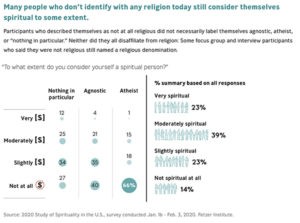Surveys have reported on the decline of religious engagement in the United States for decades, but a new study suggests there may be more to the story if the question turns to spirituality.
Newly released research by the Fetzer Institute found that most Americans, religious or not, have an affinity to spiritual beliefs and practices. This follows a previously reported trend on the rise of those who are “spiritual but not religious.”
The survey reported that 86% of U.S. adults say they are spiritual “to some extent,” 73% are similarly religious, while 97% are both religious and spiritual.
Some 85% of agnostics and atheists identified as either “slightly,” “moderately” or “very” spiritual.
The numbers suggest “both a depth and diversity of spirituality that isn’t yet reflected in our main cultural narratives,” according to Fetzer, a Michigan-based foundation focused on promoting democracy and peace through spiritual formation.

Julie Merritt Lee
Julie Merritt Lee, a Houston-based Baptist minister with a private spiritual direction practice, said the findings reflect the real-world experiences of her clients, including those who are atheist and agnostic.
“I would say a fourth of them are in the non-religious category, but spiritual,” she said.
Even among her Christian clients, many of whom are clergy, there is a strong interest in pursuing a spirituality to invigorate their faith and bring meaning to their lives. “That’s how I define spirituality: simply as meaning making.”
For pastors that often means trying to reestablish a lost connection between what they espouse from the pulpit and who God is in their lives, she said.
Among those clients who no longer or never have identified as religious, spirituality is about experimentation.
“For the non-religious it’s called ‘inter-spirituality,’ which is this idea that every spiritual or religious tradition has something to offer,” Merritt Lee said.

So, they may take from Zen Buddhism and Native American traditions while leaning into Christian ascetical practices around the denial of self in the pursuit of humility.
Even those who have abandoned Christianity often retain a spiritual attachment to certain practices, symbols and narratives, such as Communion or the Resurrection, she added. “They don’t want to recite the creeds and cannot reconcile the virgin birth with science, but some of the stories still hold meaning for them.”
According to the study, variety is one of the common denominators in American spirituality.
“People identify a wide range of experiences and activities as spiritual, and they are regularly engaging in them or seeking them out both within and outside religious institutions,” the survey found.
Close to 50% of respondents said they have become more spiritual throughout their lives.
The data were gathered through focus groups, interviews beginning in 2018 and a national survey of more than 3,600 adults conducted in January and February this year.
Close to 50% of respondents said they have become more spiritual throughout their lives, and most engage in at least one religious or spiritual activity on a weekly basis.
Action was another key finding uncovered by researchers: “highly spiritual” persons said they are more likely to believe in civic and political engagement to impact their communities and the world.
“Recognizing this diversity allows a common thread to emerge, one that reveals that it is human to be spiritual and that engaging this spirituality can engender a greater good,” Fetzer President and CEO Bob Boisture said in his introduction to the survey.
Related articles:
Baptist upbringing inspires sociologist’s study of SBC controversy, American faith
New American religious ‘types’ revealed in survey, quiz
‘Spiritual but not religious’ or ‘religious but not spiritual’?


